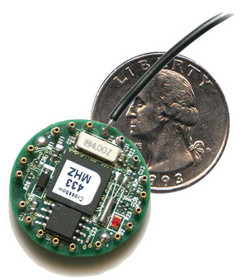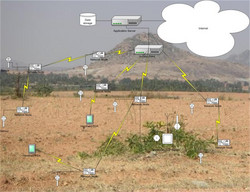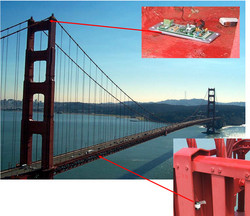Wireless Sensor Networks Lab
Overview
- SWS: 4, ECTS: 7 (for 10 credits , e.g. Media Informatics, you have to write a detailed project report)
- Lecturer: Prof. Dr. Klaus Wehrle
- Teaching Assistants: Matteo Ceriotti, René Hummen
- For more information see also the event's CAMPUS page.
- Registration for this course takes place at the central location.
- Important dates:
- Weekly meetings: Probably on Mondays 2pm to 4pm in the i4 Seminar Room (Room 4105, Building E1, Ahornstr. 55, Computer Science Campus)
- Introductory meeting: early April, i.e. first Monday in the term, same place and time as the weekly meetings
- Part I: Sensor networks basics: April, May
- Part II: Individual sensor network projects: June to July, maybe August
- Presentation of results: End of July, probably last week of the term
What are wireless sensor networks?
Wireless sensor networks consist of many - up to several thousand - small distributed computing devices that sense and interact with the environment. Various sensors allow a sensor node to measure temperature, sound, vibration, pressure, motion or pollution. Their low price and low energy ensures that sensor networks can be deployed in large numbers. A sensor node consists of a small microcontroller, a radio device, some sensors, and a power supply, usually a battery. Their resources in terms of energy, memory, computational power and bandwidth are severely limited, making sensor nodes an interesting research topic.
Due to their processing and communication abilities wireless sensor networks are intelligent. Thus, the network can independently from human interaction deal with node failure, aggregate measurements from various nodes into meaningful data, reprogram selected nodes for new tasks, ...
Interesting research areas in sensor networks are:
- Sensor node hardware
- Operating systems for sensor nodes
- Communication
- Medium Access Control (MAC)
- Routing
- Energy awareness
- Data aggregation and fusion
- Distributed data bases
- Distributed algorithms and computing
- And many many others
Why are wireless sensor networks cool?
In the 1980s, the PC revolution put computing at our fingertips.
In the 1990s, the Internet revolution connected us to an information web that spans the planet.
And now the next revolution is connecting the Internet back to the physical world we live in - in effect, giving that world its first electronic nervous system. Call it the Sensor Revolution: an outpouring of devices that monitor our surroundings in ways we could barely imagine a few years ago. Some of it is already here. The rest is coming soon.
(from Special Report on Sensor Networks, National Science Foundation (NSF), USA)
Why should I take a lab on wireless sensor networks?
Most of you need to take a lab anyway, so why not this one?
To be honest, wireless sensor networks are an ideal candidate for a lab to give you a hands-on experience on distributed systems and communications.
What should I bring?
Now, this is a hands-on lab on distributed systems. Thus, you should bring some knowledge in this area.
The ideal prerequisits are:
- Bachelor students doing it at a Master's course: We recommend taking this lab after you took the "Datenkommunikation und Sicherheit" lecture.
- Some lectures in the area of Distributed Systems, Communication Systems and/or Mobile Communication.
- Taking (or having taken) our "Mobile Internet Technology" lecture or "Advanced Internet Technology" lecture is helpful.
- Knowledge of C programming, additionally some Java or Python is helpful.
- Strong interest and willingness to contribute time
What will I do in the wireless sensor networks lab?
The wireless sensor networks lab consists of two parts: (1) Becoming friends with a sensor node and (2) your first sensor node project.
In the first part, we introduce you to the sensor nodes. Lab sessions and your tasks (hands-on experience) cover
- Introduction to the sensor nodes, including their hardware
- Operating Systems (TinyOS)
- MAC and routing in wireless sensor networks
- Data collection, aggregation, fusion
- Distributed algorithms
- ...
After this introduction the second half of the lab will be a project. Thus, you and your teammate(s) will choose a project (with the help of the teaching assistants). They will give various suggestions of projects that they consider interesting, but you are very welcome to find your own topic. All projects are supposed to address open research problems in wireless sensor networks.









